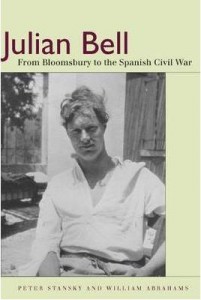Review: Julian Bell from Bloomsbury to the SCW
 Julian Bell: From Bloomsbury to the Spanish Civil War. By Peter Stansky and William Abrahams. Stanford University Press, 2012. (Buy at Powells and support ALBA.)
Julian Bell: From Bloomsbury to the Spanish Civil War. By Peter Stansky and William Abrahams. Stanford University Press, 2012. (Buy at Powells and support ALBA.)
In 1966, Peter Stansky and William Abrahams published Journey to the Frontier, which followed the lives of two young poets from families with strong intellectual and artistic backgrounds, both of whom died in the Spanish Civil War. John Cornford went to Cambridge, joined the Communist Party, wrote committed poetry, and recruited for and enlisted in the International Brigades. Julian Bell went to Cambridge, wrote some good nature poetry, and followed a road to Spain that took a number of telling detours.
In the past four decades, new information about Bell has come to light, some of it personal details that friends were less likely to share in the mid-1960s, when a sense of decorum and privacy were a strong part of British intellectual culture. Now, with the support of the heirs, Stansky has expanded the sections about Julian Bell to produce a full-scale biography of that young man. (Abrahams, one of our great literary editors, died in 1998.)
Bell was the son of painter Vanessa Bell and nephew of Virginia Woolf. In a sense, he was a child of Bloomsbury, that group of artists that charted a new aesthetic away from Edwardian tradition. He grew up wanting to be a man of action and took an interest in the nature of war, while at the same time taking an intense interest in what the future of poetry should be like. At King’s College, Cambridge, he seemed to lose his way. After a brief affair with Anthony Blunt (who later became a Soviet spy), Julian fell in love several times; in all his affairs, he wrote openly and honestly to his mother about his relationships.
Bell met with some success as a poet, producing two books, but he had trouble shaping a manuscript that would earn him a fellowship. Trying to find a new direction, he took a position in China to teach English literature. There he fell in love with his dean’s wife.
As the 1930s progressed, so did Bell’s political commitments. When he had to leave China because of his affair, he decided to join the International Brigades. There was enormous pressure from his family not to go. He was told that his talents could be better exploited by becoming involved politically at home. Others worried how this move would affect his mother. As a compromise, Julian agreed to drive an ambulance rather than enlist as a soldier.
Stansky and Abrahams divide Bell’s life at Cambridge into three sections, examining his intellectual development, his love affairs, and his increasing interest in politics. As a result, however, the reader doesn’t get an integrated sense of how these three threads weave together. The writers do a fine job of excerpting poems, letters, and essays to give a sense of Bell’s thinking. At times, we see Julian so closely that we don’t get a sense of his charisma.
The most personal sections of the book are the most riveting. The authors do a fine job of catching the way Bell’s affairs start as great passionate encounters, then as he rethinks them, in the background always concerned as to how his mother will respond to the woman in his life. The chapter on China, full of fresh information, is particularly rich, and the final chapter on Bell in Spain is strongest when capturing that particular tension many who went to Spain must have felt when deciding if they should join the fray.
Bell seems to be at his finest when in Spain. We don’t see the same confused young man who seemed to seek out love affairs as a way to give his life direction. We find someone who becomes the hallmark of dedication. So it comes as a surprise when Stansky writes, “His death was a terrible waste.” This is much different from the end of the original book, Journey to the Frontier, when the two writers merge Julian’s death with the deaths of all those who had fought for the Spanish Republic.
Charles Oberndorf is working on a biographical novel about Lincoln Brigade vet Abe Osheroff.














